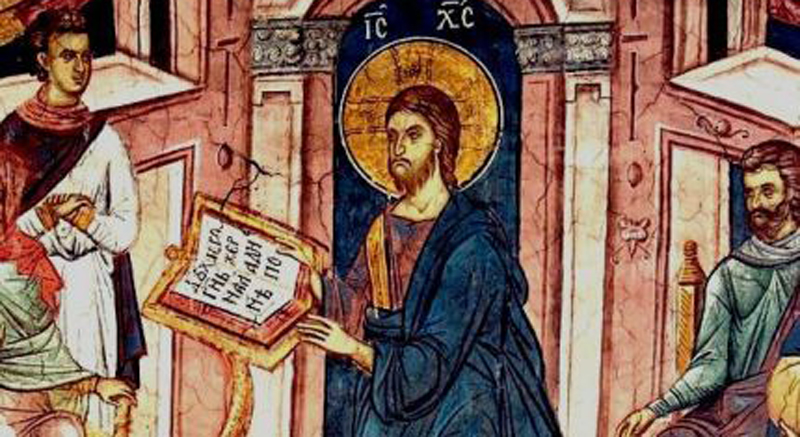Third Sunday of Ordinary Time
Call to worship
Jesus had a clear understanding of his mission — to bring glad tidings to the poor, to captives, to the blind and the oppressed. As God’s Word inspired his mission, so does it fill us with joy and purpose. Today, Pope Francis calls us to remember the treasure we have in God’s Word.
- To the point: Luke portrays Jesus as One who had a clear understanding of who he was and his mission. He was “in the power of the Spirit.” And his mission was “to bring glad tidings” to the poor, captives, blind, oppressed. Luke also had a clear understanding of who he was and his mission: he investigated “everything accurately anew” in order to proclaim the Good News. From the very beginning, what Jesus came to fulfill has been observed, treasured, handed down. Now we ourselves are to be the bearers of the Good News so that others may “realize the certainty” of the story we have received.
- Connecting the Gospel (Luke 1:1-4, 4:14-21) to the first reading: Nehemiah provides details that assure the people the words proclaimed by Ezra were, indeed, the words of God. As Jesus proclaimed glad tidings “in the power of the Spirit,” so must our proclamation of the Good News come from the Spirit who dwells within us. The details of our daily living must assure others that the words we proclaim are, indeed, from God.
- Connecting the Gospel to experience: We are all familiar with the power of words to shape our identity and way of life. Society offers conflicting messages that often pull us in many directions. In the midst of all these competing words, God’s word is the true source of our identity as Christian people.
Centering prayers
The Gospel
(Luke 1: 1-4; 4: 14-21)
He has anointed me to bring glad tidings to the poor …
Jesus, rise, spread out the scroll –– like Ezra, your priest-scribe
–– and declare to the people and to us that God is in our midst this day.
Oh Earth, you are holy now. Holy Spirit, touch our being and our doing.
Let us feed and shelter the poor, welcome immigrants,
free the prisoners, fix climate crisis.
Brush our days with grace.
The First Reading
(Nehemiah: 8: 2-4a, 5-6, 8-10)
Today is holy to the Lord.
They heard your saving words, O God;
and they bent heads in tears,
but then felt great joy in your mercy.
Let us too be hearers and doers of your word.
Then will our day be holy.
The Second Reading
(I Corinthinans 12:12-30)
We were all given to drink of the same Spirit …
Father, we thank you. Your gifts are great.
From them words flow, smooth as nectar;
they heal, or else they teach,
often tell stories that lead
their hearers straight to heaven.
Our finances suddenly balance.
Holy Spirit, thank you.
Let us all, fancy and plain, praise you.
Copyright © 2021, Anne M. Osdieck.
Two new eras
Two men unrolled papyrus scrolls and read them to the people. In each case, their proclamations signaled the beginning of a new era. One is Ezra the scribe, and the other is Jesus of Nazareth. Four centuries separated them.
Today’s first reading takes place in Jerusalem after the return of the exiles from their 50 years of captivity. Cyrus, the great King of Persia, freed them and allowed them to return home. They returned in great caravans; Ezra led one for four months across the desert. When they returned, they found Jerusalem destroyed, their great temple that Solomon built demolished, and their holy city full of moral decay. Reconstruction of a country is immensely difficult. Ezra worked hard to bring back the moral fiber of the nation. He “read plainly” from the papyrus that held “the book of the law”. He started at daybreak and continued until mid-day. The people were so touched they began to cry. Not only were they home in their city; they were home in their hearts – able to worship God freely once again. A new era had begun.
Four centuries later, Jesus made a similar return to Galilee, the region where he had grown up. He had just been baptized and spent holy time in the desert. Now, “in the power of the Spirit”, he journeyed back to his hometown, took up the papyrus scroll containing the book of Isaiah and read God’s Word aloud. According to Luke, this was the first action of Jesus’ public life – all eyes were fixed upon him, as he announced that he was the fulfillment of what he had just read; he was God’s Promised One sent to bring new life.
We, who live centuries after both of these emotional events, are not returning captives who have been away for 50 years. Nor do we return today after many years to the place where we were raised. But we are in the temple, listening to God’s Word as it is proclaimed. We are in the holy place, with our eyes fixed on Jesus. We return here week after week, opening our hearts and minds to be transformed and lifted by God’s Word. Here we allow Jesus to minister to us, to rebuild our lives and refashion our hearts. This treasure we have can move us to tears.
Music for reflection
